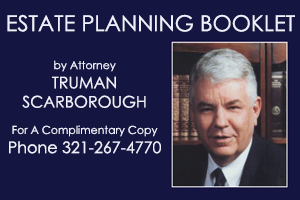What is Probate?
By Attorney Truman Scarborough
This is the third in a series of articles on probate. When someone dies, assets titled just in the decedent’s name with no beneficiaries are frozen. A Power of Attorney does not help, since it ends when the creator dies. It is similar to an employer – employee relationship, where If an employer goes out of business there are no employees. The process where property is transferred from the decedent to the beneficiaries is called “Probate”.
In these articles, we have been looking at the “Formal” probate process for larger estates. In next month’s article we will look at two shorter processes called “Summary Administration” and “Disposition of Personal Property Without Administration”. Summary Administration is available: 1] two years after the decedent date of death or 2] when there are no creditors and the probate assets are less than $75,000. While Formal Probate takes approximately six month (if there are no problems). Summary Administration takes less time. With Summary Administration, the court does not appoint a Personal Representative (executor) to administer the estate but simply enters an order directing distribution of assets to the beneficiaries.
With Formal Probate, the probate court creates a legal entity called the “Probate Estate” and appoints a Personal Representative to administer the estate. The word “Probate” essentially means “to prove.” You may know that there are no problems with beneficiaries or creditors, but the court does not.
In the last article we looked at the Personal Representative’s responsibilities to beneficiaries and creditors. We will now look at the Personal Representative’s responsibilities for taxes and expenses for administration.
TAXES: The Personal Representative must file a Personal 1040 Income Tax Return for income received while the decedent was living. Income received after the decedent’s death is reported on a separate 1041 Fiduciary Tax Return . We cannot use a person’s social security after they die and the Personal Representative must obtain a new tax identification number called an EIN from the IRS. For income earned while the decedent was living, 1099s will show the decedent’s social security number. Income earned after the decedent passed away will show the EIN. There is a substantially higher tax rate on a 1041 than on an individual 1040 return. To avoid the higher tax rate, income is distributed from the estate to the beneficiaries and shown on Schedule K-1s. This way the income can be report on individual 1040 tax returns, avoiding the higher tax rate on the 1041.
For large estates, the Personal Representative may also have to file a 706 Estate Tax Return. An individual can now pass $13,610,000 before there is any estate tax. For a couple it is double the amount $27,220,000. If the first spouse to die has not used his/her full $13,610,000, the unused balance is available to the surviving spouse.
ADMINISTRATION EXPENSES: The Personal Representative will incur various expenses including attorney’s fees. Florida Probate Rules require that every Personal Representative be represented by an attorney unless he/she is the sole interested person. The Florida Statutes suggest a fee for the attorney as well as the Personal Representative of 3% for estates between $100,000 and a million dollars for ordinary services. The Statutes provides for additional fees for extraordinary services. There are also court filing fees and the cost of publishing Notice to Creditors in the newspaper.
For further information on estate planning you may be interested in Attorney Truman Scarborough’s Booklet on Estate Planning in Florida. It is available without charge or obligation by calling (321) 267 – 4770. His office is located at 239 Harrison Street, Titusville, Florida.


Recent Comments